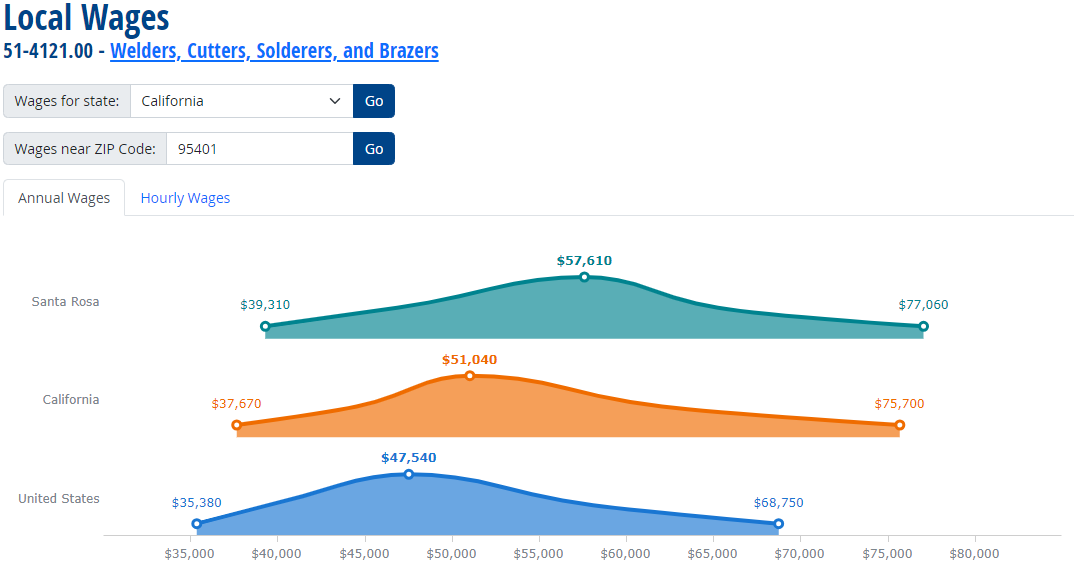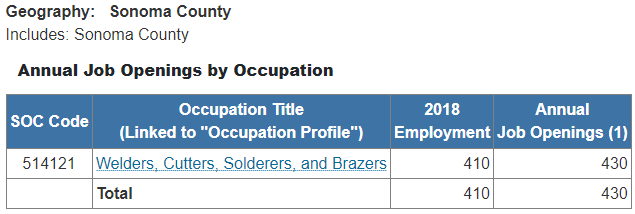Welding Labor Market Information
Occupational Information Network (O*NET)
Welders, Cutters, Solderers, and Brazers
Standard Occupational Classification: 51-4121.00
Job Description: Use hand-welding, flame-cutting, hand-soldering, or brazing equipment to weld or join metal components or to fill holes, indentations, or seams of fabricated metal products.
Sample of reported job titles:
- Assembly Line Brazer
- Brazer
- Fabrication Welder
- Maintenance Welder
- MIG Welder (Metal Inert Gas Welder)
- Solderer
- TIG Welder (Tungsten Inert Gas Welder)
- Welder
- Welder Fitter
- Wirer
Tasks
- Operate safety equipment and use safe work habits.
- Examine workpieces for defects and measure workpieces with straightedges or templates to ensure conformance with specifications.
- Weld components in flat, vertical, or overhead positions.
- Detect faulty operation of equipment or defective materials and notify supervisors.
- Recognize, set up, and operate hand and power tools common to the welding trade, such as shielded metal arc and gas metal arc welding equipment.
Work Activities
- Getting Information — Observing, receiving, and otherwise obtaining information from all relevant sources.
- Inspecting Equipment, Structures, or Materials — Inspecting equipment, structures, or materials to identify the cause of errors or other problems or defects.
- Identifying Objects, Actions, and Events — Identifying information by categorizing, estimating, recognizing differences or similarities, and detecting changes in circumstances or events.
- Handling and Moving Objects — Using hands and arms in handling, installing, positioning, and moving materials, and manipulating things.
- Monitoring Processes, Materials, or Surroundings — Monitoring and reviewing information from materials, events, or the environment, to detect or assess problems.
Abilities
- Arm-Hand Steadiness — The ability to keep your hand and arm steady while moving your arm or while holding your arm and hand in one position.
- Near Vision — The ability to see details at close range (within a few feet of the observer).
- Finger Dexterity — The ability to make precisely coordinated movements of the fingers of one or both hands to grasp, manipulate, or assemble very small objects.
- Problem Sensitivity — The ability to tell when something is wrong or is likely to go wrong. It does not involve solving the problem, only recognizing that there is a problem.
- Control Precision — The ability to quickly and repeatedly adjust the controls of a machine or a vehicle to exact positions.
Work Styles
- Attention to Detail — Job requires being careful about detail and thorough in completing work tasks.
- Dependability — Job requires being reliable, responsible, and dependable, and fulfilling obligations.
- Cooperation — Job requires being pleasant with others on the job and displaying a good-natured, cooperative attitude.
- Initiative — Job requires a willingness to take on responsibilities and challenges.
- Self-Control — Job requires maintaining composure, keeping emotions in check, controlling anger, and avoiding aggressive behavior, even in very difficult situations.

